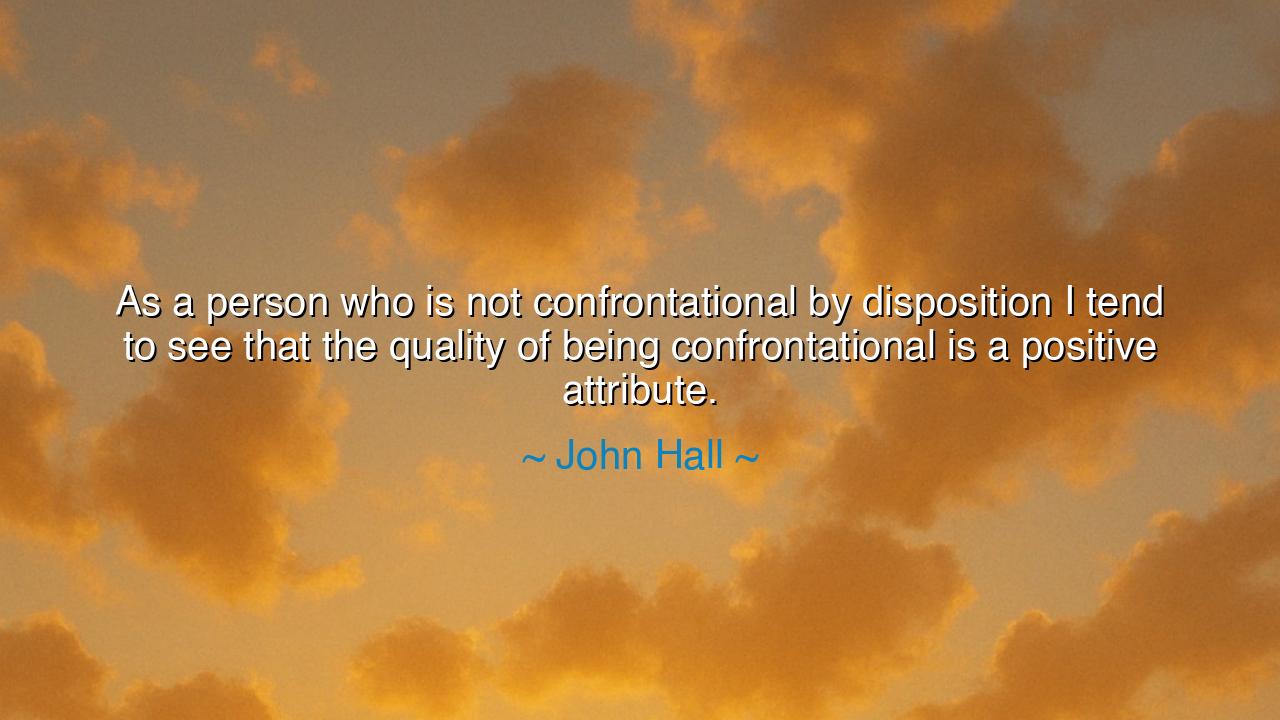
As a person who is not confrontational by disposition I tend to
As a person who is not confrontational by disposition I tend to see that the quality of being confrontational is a positive attribute.






When John Hall confessed, “As a person who is not confrontational by disposition I tend to see that the quality of being confrontational is a positive attribute,” he unveiled a paradox of human nature. Those who are gentle of spirit often shrink from strife, seeking peace where others would wage battle. Yet wisdom teaches that there are moments when silence becomes surrender, and when to confront is not to destroy but to preserve truth, honor, and justice. Thus, he elevates the act of confrontation from mere conflict to an instrument of growth and strength.
The ancients knew this well. Socrates, though calm in demeanor, was profoundly confrontational in spirit. By questioning, by challenging falsehood, he stirred the souls of Athens to deeper thought. His disposition was not that of a warrior with sword, but of a thinker with words sharper than steel. His willingness to confront complacency was the reason his city condemned him, yet also the reason his wisdom has outlived empires. In his life, we see that confrontation may be the seed of transformation.
To see the positive side of being confrontational is to recognize that growth often demands discomfort. A teacher who challenges their pupil, a leader who faces corruption, a friend who speaks hard truth—all bear the weight of confrontation for the sake of love and progress. To flee from it entirely is to abandon the soul’s duty to defend what is right. John Hall’s words remind us that even those not born to quarrel can, and must, learn to wield confrontation with purpose and integrity.
History gives us another tale: Martin Luther King Jr., a man of peace, nonviolent by disposition, yet profoundly confrontational in method. Through marches, boycotts, and fiery words, he confronted injustice not with violence but with courage. His confrontation was positive, for it unmasked oppression and awakened the conscience of a nation. Without it, silence would have allowed chains to remain unbroken.
Thus let the teaching be carried forward: confrontation, when wedded to wisdom and righteousness, is not destruction but renewal. It is the hammer that cracks the shell of falsehood, the spark that ignites reform, the voice that breaks silence so truth may be heard. Let not the gentle-hearted fear it, for even those of quiet disposition may find in confrontation their most heroic strength.






QNManh Quan Nguyen
It’s fascinating that John Hall sees confrontation as a positive attribute even though it doesn’t come naturally to him. Does this mean we should all push ourselves to embrace confrontation more, or is it about understanding when confrontation is necessary and when it’s better to let things go? Could this perspective help us navigate tricky conversations and disagreements more effectively?
PA01 - Tieu Ngoc Phuong Anh
John Hall's reflection on confrontation being a positive attribute, despite not being confrontational by nature, brings an interesting dynamic to how we view conflict. Is confrontation always productive, or can it sometimes escalate situations unnecessarily? How do we ensure that confrontation remains constructive, fostering communication and resolution, rather than creating division or hostility in relationships or workplaces?
GBnguyen gia bao
I can relate to John Hall’s sentiment about being non-confrontational by nature but also seeing confrontation as a positive attribute. I’ve often found myself avoiding conflict, but sometimes confrontation brings clarity and resolution. How do we cultivate the courage to confront when needed without allowing it to turn into aggression? What’s the line between constructive confrontation and unnecessary conflict?
KHLe Diep Kha Hy
It’s interesting that John Hall, someone who isn’t naturally confrontational, sees value in confrontation. I wonder, though, if it’s possible to be assertive without being confrontational. Does this imply that conflict is necessary for growth and clarity, or can we achieve the same outcomes through dialogue and understanding without direct confrontation? How do we know when confrontation is the right path to take?
HV9/4 Hien Vi
John Hall’s perspective on being non-confrontational yet recognizing the value of confrontation is intriguing. It makes me wonder whether confrontation is truly a positive attribute or if it’s about how we approach conflict. Can confrontational behavior always be constructive, or does it sometimes breed unnecessary tension? Is there a balance between standing up for yourself and avoiding conflict where possible, especially in delicate situations?